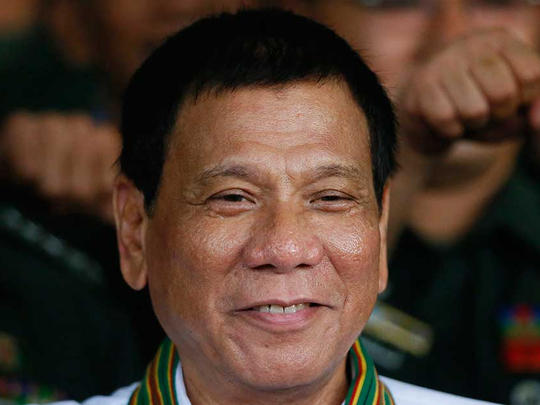
Manila: Philippine President Rodrigo Duterte’s visit to China next week will reap economic and political benefits with the signing of $3 billion (Dh11 billion) worth of agreements from banks and private institutions, sources said.
They believe the visit will prompt stronger business relations between the two countries, whose ties were affected by overlapping claims in the South China Sea.
“[Chinese] banks are committing funds to support the growth of the Philippine economy in general. That means we will have a lot of loans and investments for whatever projects we want to get in, both private and government,” said Trade Secretary Ramon Lopez.
Duterte is focused on investments on infrastructure, explained Philippine Finance Minister Carlos Dominguez. Sources said China will help build a railway in Mindanao, southern Philippines, turf of five million Filipino-Muslims including Filipino-Muslim rebels with pro-autonomy peace settlements with the government, and Filipino-Muslim separatists who have pledged allegiance to Daesh.
Duterte will also ask China to lift a ban on 27 Philippine firms that are exporting fruits to China. “It will be given as a gift to the president,” said Philippine Agriculture Secretary Emmanuel Pinol, adding, “China also wants coconuts, dragon fruits, and mangoes, including fish, shrimps, and prawns from the Philippines.”
Duterte wants China to open its market to overseas Filipino workers, a source from the Labour Department said,
Duterte’s call for higher investments from the Chinese was based on the high investments by many Filipino-Chinese businessmen in China. Joining Duterte in Beijing is Hans Sy of the SM retail which has six SM malls in China, and will open its seventh SM mall in Tianjin.
Robinsons Land Corp. (RLC) president Frederick Go has a 1,300 unit township project in Chengdu, China. Ramon S. Ang of Manila’s San Miguel has two breweries in China. Liwayway Marketing president Ozsen Chan has 16 factories in China; and has bought Spain’s Cola Cao business in China for $13 million in early 2016.
Alfredo Yao, chairman and president of Zest-O said his beverage manufacturing company entered into a joint venture with China’s Huadong United Can Co. and formed the Huadong Zest-O Beverage Co. Ltd in 1994.
Explaining the business synergy of Duterte’s visit to China, PCCI chairman emeritus Francis Chua said, “We have a very popular president who has decided to have a better relationship with China, who thinks, instead of fighting, why don’t we just become friends?”
When Duterte announced a pragmatic and economic-oriented pivot to China, he called it independent foreign policy, “observers have mistakenly believed the Philippines is capable of strengthening China’s claim to the whole of the South China Sea,” analysts said.
Last July 25, The Hague-based Permanent Arbitration Court ruled that China’s claim to the entire South China Sea and its enhancement of rocks and shoals into small islands there were illegal; that China should open the Scarborough Shoal 230 kilometres west of Philippines’ Zambales Province to other claimants in the South China Sea. The Philippines filed the case in 2013. It was occupied by Beijing in a standoff with Philippine vessels since mid-2012.
Duterte has opted for bilateral talks (to resolve the issue) with China for two reasons: to persuade China to allow Filipino fishermen to fish in Scarborough Shoal off the South China Sea; get better economic concessions from China, including an arms deal.
Duterte has been sweet-talking China with speeches against the United States, a military ally for 65 years, He has hurled curses at US President Barack Obama, threats to end US-Philippine war-games (which began in 2002); presence of US anti-terror forces in the south which began in 2002; and a review of the US-Philippines Enhanced Defence Cooperation Agreement (EDCA) which allows increased US rotational troops and access to eight Philippine bases nationwide which was signed in 2014.












